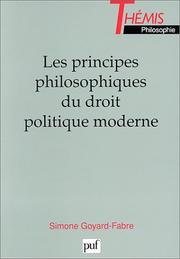| Listing 1 - 10 of 18 | << page >> |
Sort by
|
Book
ISBN: 8880915789 9788880915782 Year: 1998 Publisher: Bologna: CLUEB,
Abstract | Keywords | Export | Availability | Bookmark
 Loading...
Loading...Choose an application
- Reference Manager
- EndNote
- RefWorks (Direct export to RefWorks)
Law and politics --- Law
Book
ISBN: 2827103109 9782827103102 Year: 1987 Publisher: Fribourg Ed. universitaires
Abstract | Keywords | Export | Availability | Bookmark
 Loading...
Loading...Choose an application
- Reference Manager
- EndNote
- RefWorks (Direct export to RefWorks)
Law --- Public law --- Philosophy --- History --- Political aspects --- 340.12 --- -Law and politics --- -Public law --- -Law --- Law and politics --- Acts, Legislative --- Enactments, Legislative --- Laws (Statutes) --- Legislative acts --- Legislative enactments --- Jurisprudence --- Legislation --- Natuurrecht. Rechtsfilosofie --(algemeen) --- -History --- -Natuurrecht. Rechtsfilosofie --(algemeen) --- 340.12 Natuurrecht. Rechtsfilosofie --(algemeen) --- Philosophy&delete& --- Political aspects&delete& --- Law - Philosophy - History --- Law - Political aspects - History --- Public law - Switzerland - History
Book
ISBN: 9782213654720 2213654727 Year: 2013 Publisher: Paris : Fayard,
Abstract | Keywords | Export | Availability | Bookmark
 Loading...
Loading...Choose an application
- Reference Manager
- EndNote
- RefWorks (Direct export to RefWorks)
L'espoir né de la création de l'Organisation des Nations unies après la Seconde Guerre mondiale n'a pas été suivi des bienfaits attendus et la fin de la guerre froide n'a pas été l'occasion de nouvelles avancées dans la prévention des conflits. Le monde globalisé reste en proie à la violence, aux entraves à la liberté, aux inégalités grandissantes, à un usage inconscient et destructeur des ressources de la planète. Cette situation impose de penser une nouvelle organisation de la communauté universelle, ce qui ne se fera pas sans un changement de paradigme. Le principe qui préside encore à l'organisation du monde est celui de la division en États souverains. Mais il est illusoire de croire que la souveraineté puisse être la condition de la paix. Dans un nombre grandissant d'États, elle est réduite à un pouvoir de répression. Elle ne garantit pas la liberté des groupes ni la recherche du bonheur commun. Elle fait obstacle aux avancées du droit international et elle permet l'impunité des dirigeants. Partant de ce constat, Monique Chemillier-Gendreau met sa longue expérience du droit (par l'enseignement, mais aussi par la participation à des procédures internationales) au service d'une analyse critique de la situation actuelle. Elle prône l'abandon du concept de souveraineté, porteur des possibilités de guerre, au profit de celui d'association politique des hommes libres, retour à la liberté du peuple, mais aussi à sa responsabilité. Si elle défend cette idée à l'échelle des communautés nationales, elle l'élargit à toutes les communautés politiques, infra ou supra-nationales. Partout où des hommes et des femmes assemblés ont à décider d'une part de leur destin, le politique doit être réhabilité contre l'emprise de l'économique et contre les bureaucraties actuellement à l'oeuvre.
International Cooperation --- Internationalism --- Democracy --- War --- State, The --- Sovereignty --- Causes --- International law and politics - Peace building - Sovereignty --- International cooperation. --- Internationalism. --- Democracy. --- State, The. --- Sovereignty. --- Causes. --- International law and politics - Peace building - Sovereignty. --- Coopération internationale --- internationalisme --- Démocratie --- Guerre --- Etat --- Souveraineté --- Peace-building --- Consolidation de la paix --- War - Causes

ISBN: 0700608575 0700609997 9780700609994 9780700608577 Year: 1997 Publisher: Lawrence, Kan. University Press of Kansas
Abstract | Keywords | Export | Availability | Bookmark
 Loading...
Loading...Choose an application
- Reference Manager
- EndNote
- RefWorks (Direct export to RefWorks)
Now that contemporary scholars have begun to extend postmodern theory to law, an appraisal of its relevance in that sphere is especially important. This book offers a critical introduction to writings on law by key postmodern philosophers--Nietzsche, Foucault, Derrida, Lyotard, and Rorty--and articulates the strengths and weaknesses of postmodern legal theory. Douglas Litowitz takes a critical stance on these thinkers and determines that postmodern philosophy falls short of a positive jurisprudence--a vision of a just state and a moral legal system--because it takes an unduly external perspective on the law and espouses an unworkable anti-foundationalism. The postmodernist perspective, he argues, is too removed from our legal practices to resolve legal problems like abortion, flag burning, or pornography. Litowitz shows that postmodernism is so far removed from the language games in which lawyers and judges decide key legal issues that it leaves the internal practice of law untouched, and its radical rejection of foundations precludes a position from which a just legal system might be built. Still, postmodernism can make a significant contribution to legal theory by showing the limits of existing arrangements, focusing attention on genealogy and discourse, and empowering those who have been denied a voice under the legal system. Postmodern Philosophy and Law bridges the gap between Anglo-American jurisprudence and postmodern theory by discussing not only traditional approaches such as natural law theory and legal positivism but also continental philosophy and critical legal studies. It is the first book to expound and critique postmodern legal theory and its ramifications for a mainstream audience of legal scholars and philosophers.
Droit et politique --- Filosofie van het postmodernisme --- Law and politics --- Philosophie postmoderniste --- Postmodernism --- Postmodernisme --- Postmodernisme (esthétique) --- Postmodernisme (filosofie) --- Postmodernisme (philosophie) --- Recht en politiek --- Law --- Philosophy --- Political aspects --- Legal theory and methods. Philosophy of law --- Lyotard, Jean-François --- Derrida, Jacques --- Foucault, Michel --- Nietzsche, Friedrich --- Rorty, Richard --- Law - Philosophy --- Law - Political aspects
Book
ISBN: 2247021956 9782247021956 Year: 1996 Publisher: Paris Dalloz
Abstract | Keywords | Export | Availability | Bookmark
 Loading...
Loading...Choose an application
- Reference Manager
- EndNote
- RefWorks (Direct export to RefWorks)
Rule of law --- Administrative law --- Constitutional law --- Règle de droit --- Droit administratif --- Droit constitutionnel --- Braibant, Guy --- --Bibliographie --- --Rule of law --- Law --- Political aspects --- Law and politics --- Supremacy of law --- Administration --- Law, Administrative --- Public administration --- Public law --- Law and legislation --- Festschrift - Libri Amicorum --- Règle de droit --- Bibliographie --- Law - Political aspects --- Braibant guy
Book
ISBN: 9064394318 9789064394317 Year: 1987 Publisher: Bruxelles
Abstract | Keywords | Export | Availability | Bookmark
 Loading...
Loading...Choose an application
- Reference Manager
- EndNote
- RefWorks (Direct export to RefWorks)
Law and politics --- Effectivité et validité du droit --- Droit et politique --- 340.12 <493> --- Natuurrecht. Rechtsfilosofie --(algemeen)--België --- 340.12 <493> Natuurrecht. Rechtsfilosofie --(algemeen)--België --- Legal theory and methods. Philosophy of law --- Effectiveness and validity of law --- Law --- Power (Philosophy) --- Power (Social sciences) --- Effectivité et validité du droit --- Droit --- Pouvoir (Morale) --- Pouvoir (Sciences sociales) --- Philosophy --- Political aspects. --- Philosophie
Book
ISBN: 2802720813 9782802720812 Year: 2005 Volume: 6 Publisher: Bruxelles Bruylant
Abstract | Keywords | Export | Availability | Bookmark
 Loading...
Loading...Choose an application
- Reference Manager
- EndNote
- RefWorks (Direct export to RefWorks)
Public law. Constitutional law --- Political systems --- International law --- Cameroon --- Cameroun ; politique --- Kameroen ; politiek --- Rechtssociologie --- Sociologie du droit --- Law and politics --- Constitutional law --- Constitutional history --- Droit et politique --- Droit constitutionnel --- Histoire constitutionnelle --- Law --- Political corruption --- Justice et politique--Cameroun. --- Political aspects --- Boss rule --- Corruption (in politics) --- Graft in politics --- Malversation --- Political scandals --- Politics, Practical --- Acts, Legislative --- Enactments, Legislative --- Laws (Statutes) --- Legislative acts --- Legislative enactments --- Corrupt practices --- Corruption --- Misconduct in office --- Jurisprudence --- Legislation --- Law - Political aspects - Cameroon. --- Political corruption - Cameroon. --- Acqui 2006

ISBN: 2802801031 9782802801030 Year: 1995 Volume: 66 Publisher: Bruxelles FUSL
Abstract | Keywords | Export | Availability | Bookmark
 Loading...
Loading...Choose an application
- Reference Manager
- EndNote
- RefWorks (Direct export to RefWorks)
Legal theory and methods. Philosophy of law --- Democracy --- Democratie --- Droits de l'homme --- Démocratie --- Ethique philosophique --- Inspraak in het beleid --- Maatschappij --- Mensenrechten --- Overlegcultuur --- Politiek --- Politique --- Self-government --- Société --- Wijsgerige ethiek --- Law --- Droit --- Philosophy --- Philosophie --- --Droit --- --Law --- Political aspects --- Law and politics --- Political science --- Equality --- Representative government and representation --- Republics --- Democracy. --- Political aspects. --- Démocratie --- Addresses, essays, lectures --- Administrative law --- Belgium --- Constitutional law --- History --- Law - Political aspects

ISSN: 12720518 ISBN: 2130486703 9782130486701 Year: 1997 Volume: *4 Publisher: Paris PUF
Abstract | Keywords | Export | Availability | Bookmark
 Loading...
Loading...Choose an application
- Reference Manager
- EndNote
- RefWorks (Direct export to RefWorks)
Political science --- Law and politics --- Law --- Science politique --- Droit et politique --- Droit --- History. --- Philosophy --- Histoire --- Philosophie --- Philosophie du droit --- --State, The --- 321.01 --- -State, The --- Administration --- Commonwealth, The --- Sovereignty --- Civil government --- Government --- Political theory --- Political thought --- Politics --- Science, Political --- Social sciences --- State, The --- Algemene staatsleer. Politieke filosofie. Staatsleer. Staatstheorie --- -Philosophy --- State, The. --- Philosophy. --- 321.01 Algemene staatsleer. Politieke filosofie. Staatsleer. Staatstheorie --- Political aspects. --- Political philosophy --- Jurisprudence --- History --- Law - Philosophy --- Political science - Philosophy

ISBN: 2802710850 2800411732 9782802710851 Year: 1997 Volume: 35 Publisher: Bruxelles Bruylant
Abstract | Keywords | Export | Availability | Bookmark
 Loading...
Loading...Choose an application
- Reference Manager
- EndNote
- RefWorks (Direct export to RefWorks)
Former Yugoslav republics --- International law --- Law --- International status --- Political aspects --- Law of nations: objects and subjects --- Yugoslavia --- Law and politics --- Yugoslav War, 1991-1995 --- Droit et politique --- Guerre dans l'ex-Yougoslavie, 1991-1995 --- Ex-Yougoslavie --- Statut international --- -International law --- 341 --- Law of nations --- Nations, Law of --- Public international law --- Droit international. --- International status. --- LawInternational status --- International law. --- Political aspects. --- World politics --- Politique mondiale --- Droit international --- Politics and government --- 1992 --- Ideology --- Former Yugoslav republics - International status --- Law - Political aspects
| Listing 1 - 10 of 18 | << page >> |
Sort by
|

 Search
Search Feedback
Feedback About UniCat
About UniCat  Help
Help News
News